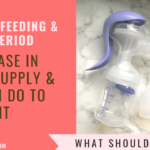
Breastfeeding much like a lot of the other things involved with pregnancy and women’s health (unfortunately), is a matter of choosing between the worst of two (or more) evils. At least this is how I look at the whole thing.
There’s too much evidence around showing the benefits of breastfeeding to just ignore it and not at least give it a good old college try. Honestly, both you and your baby will reap the benefits of the experience even if it is for a short amount of time.
However, there are a ton of moms who know the experience is one you have to certainly put mind over matter to get through it. Whether its the pain of the first latch, the period like cramps you get when feeding right after having the baby, the avoidance of clogged ducts, worrying if you will be able to maintain your supply, and just the constant call of the task every 2-3 hours…it’s A LOT to handle.
When I attempted to nurse my son when he was a baby 8 years ago, I had no clue what I was doing. I got a quick lesson from the lactation consultant at the hospital before I was discharged, but the trouble was my lack of mental clarity and determination. In addition, I did not know many other women with enough experience breastfeeding to serve as a mentor or source of support. In hindsight, I see how important these things are.
There are a couple of tips I’ve acquired through experience that I wish someone would’ve told me before I even tried breastfeeding the first time.
1. Reduce Your Stress Levels
We hear it all the time, stress is a potential killer. It’s the truth. Stress and our inability to figure out how to handle it is the root of many health issues nowadays. I am a firm believer that our culture is almost addicted to it because it praises people that get a tremendous amount of stuff done even in impossible circumstances rather than exploring the benefits of embracing scheduled rest with the goal of restoration. BUT, I am on a tangent. I will save that for another post.
Stress is also one of the fastest ways a woman can tank her breastfeeding efforts. Believe me, I’m speaking from experience. Looking back, I know this is what ruined my breastfeeding experience with my son. But, I now know I also went into the entire thing all wrong to begin with. I did not have the proper mindset, support system, mentor (yes, I said mentor because I truly believe having someone to inspire you to get through the entire thing), or proper education. In the end, I found myself frustrated, stressed, and overwhelmed. And formula became our only option.
This time around, I was dead set on making breastfeeding the ONLY option. I did my due diligence by doing as much research as possible, joining some breastfeeding Facebook groups, and found some moms that recently gave birth and were breastfeeding to ask as many questions as I could. It was through this that I was able to go into the delivery room and the days after with minimal stress, (given the situation that is), as possible.
Of course, this was my source of stress around breastfeeding I identified due to my experience the first time around. In order for it to work for you, identify your source of stress around nursing. Maybe it’s the lack of support because most of the moms, (and grandmas or aunts…whoever), think you’re crazy for making breastfeeding the only option. Maybe its the entire idea of keeping up your supply to feed your baby. Maybe it’s the pain you hear about when the baby first latches. Maybe it’s the perceived impact it will have on your sexuality and/or relationship being that your breast will become a source of food. WHATEVER IT IS…pinpoint it. Try to work on it BEFORE the baby arrives so you can have a fighting chance because with breastfeeding, it gets hard (and even harder) before it gets easier.
HOWEVER, if stress is inevitable, you may want to look into some herbal options that may help. One of my favorite herbs to take which I have also been taking off and on postpartum is Ashwagandha. I have spoke extensively about it and it’s benefits in my post Adaptogens: The Good, The Bad, And How To Use Them In Real Life.
Ashwagandha is an adaptogenic herb used in Ayurvedic healing. The term adaptogen is defined as a natural substance considered to help the body adapt to stress and to exert a normalizing effect upon bodily processes. In essence, it helps the body level itself out depending on what is needed. Ashwagandha is known for its ability to help lower stress and anxiety amongst other things. It is one of the most clinically tested herbs on the market.
In the book, Boost Your Breast Milk: An All-in-One Guide for Nursing Mothers to Build a Healthy Milk Supply the author Alicia C. Simpson shares how ashwagandha is great for reducing stress for nursing mothers. I’ve been using it for years with great results and was happy to find out it could be used while nursing. (Do NOT use it while pregnant because it may have negative effects on the womb). As always, be sure to do your own research prior to taking anything. To check out a couple of my favorite brands, click here, here, and here.
2. Stay Hydrated
This seems easy enough but when you’re busy taking care of a new little being, it’s easy to forget to drink, or eat, or shower!
I have definitely seen an increase in production when I remember to drink throughout the day. The easiest way to go about this is keeping a glass or bottle of water or other healthy beverage with you when you sit down to start nursing. Drinking this way will also aid in helping to flush the body of the excess fluids you were holding onto after the delivery, so be prepared to be running to the bathroom as well.
If I get bored with water, I also like to drink coconut water because it is so high in electrolytes and will help quench your thirst faster. Always remember to opt for one with very little or no added sugar or other funky questionable ingredients such as this one.
3. Get A Crash Course In The Science of Breastfeeding
As I mentioned before, not having much education on breastfeeding was a huge source of stress for me the first time around. I took the 30 minute class that was given at the hospital after giving birth (which covered hardly anything in hindsight), and went about my merry little way thinking it was all supposed to be super easy and natural.
WRONG!
Yes, it is natural but it can be far from easy. I had no idea about the stages of my milk production, the engorgement period and what to expect, let alone the difference between foremilk and hindmilk. I had no idea that the entire process and production was based on supply and demand and what to expect from my baby in the meantime.
Knowing this all and more is what made life much easier this time around. I knew that during the first couple of days, I wasn’t supposed to be producing tons and tons of milk and that the small amount of colostrum (the thicker more fatty milk that comes out in smaller amounts during the first couple of days postpartum), and enough for the baby. I was so concerned with making sure he wasn’t starving and was so used to seeing the baby drinking the customary bottle of formula straight out the womb. This time I knew that the baby might not eat much during the first 24 hours because they might be still sleepy from the crazy roller coaster into the big wide world. However, it was crucial for me to keep trying to latch even if it was for a couple of minutes. I also knew telling the nurses not to encourage bottle feeding or even bring it around was important to set the tone for the care and advice I was to receive while I was there.
In short, my education empowered me. And it was not only for myself and my baby, but also against those that are so used to formula feeding and question my choice especially when something seems off. So, the first time I happened to see green poop, I actually knew what it meant and what to do. (FYI, green poop in breastfed babies usually means the baby is not nursing long enough on the boob. The baby is probably getting too much of the thinner foremilk which comes out first and not the fatty hindmilk that follows it. There is no reason for concern if it happens every now and then. However, the baby might become fussy if it keeps happening. Of course, speak to your doctor or a lactation consultant about it). A highly recommended book that might help someone starting out is this one.
4. Learn How To Prevent Clogged Ducts
Clogged Ducts. Yes, that’s a thing. Basically, when the milk you are producing is not completely emptied from your breast, there is a possibility that your milk ducts can get clogged. If they are not cleared, the ducts can get inflamed and painful and even lead to mastitis. No one needs this on top of caring for a newborn.
I was completely clueless about this with my son and had no idea how to deal with it. I now know the key to preventing clogged ducts is to move the milk out. Whether it is with the baby latched on, or with a good breast pump, the milk can’t sit there for too long. This is the breast pump I am currently using and love.
In addition, I started taking a supplement called sunflower lecithin to help reduce my frequency of clogged ducts. Lecithin is an emulsifier which means it helps prevent separation. The known lecithins on the market are made from soy or sunflowers. I am not a huge advocate of soy based products due to my hormonal issues in the past, so I went with sunflower. The sunflower lecithin I purchase is non-gmo and organic and can be found here. It has helped tremendously when I noticed I had an oversupply and was pumping out excessive fore milk and not the fatty hind milk.
5. Don’t Obsess Over A Large Freezer Supply Of Milk
In our society, we tend to work in extremes. We either have and feel like we have nothing or we want a lot of something so we can feel secure “just in case” something happens.
However, as a person that was obsessed with extreme couponing I now know that a lot is not always better.
This is also the case when it comes with breastmilk. When you google breastmilk, you will more than likely find women showing off their HUGE supply of frozen breastmilk. You might even hear them speaking of how they feel secure knowing they have this large supply “just in case” something happens.
BUT THAT ISN’T NECESSARY!
If your supply is well established, you truly don’t have to aim for a freezer full of milk. It’s stressful, time consuming, and leaves you very little room for much else in your freezer unless you have a deep freezer.
Currently, I do have quite a bit of milk frozen from when my milk first came in. There was more than I every imagined, plus I was determined to be an exclusively pumping mom. That soon changed when I realized how hard it was to find time to pump when I was alone with my daughter. Instead, I worked on her latch and nursing has drastically improved since then. But, I still pump and save any extra milk that remains after feeding her. I stopped thinking about competing with the ladies on pinterest and just went grocery shopping for foods that will help support my journey to keep in the fridge instead.
These are only a few tips I wish someone mentioned to me before breastfeeding the first time around. I promise there will be more in the future so stay tuned.
FTC DISCLOSURE: Some of the links in this post are affiliate links. If you click on them and make a purchase, I will receive a small finder’s fee on the sale. This does not increase your price in any way shape or form. Using these links help support the continuation of this website. All opinions are my own. Thank you in advance.













